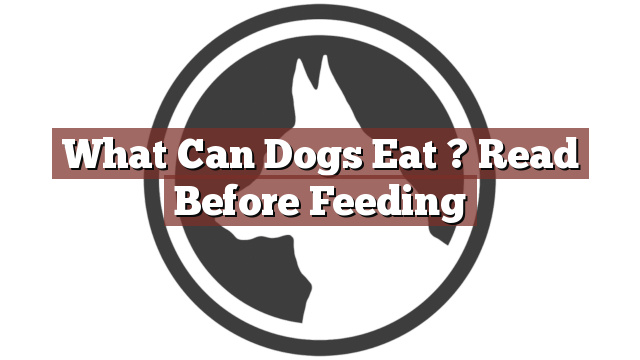Understanding Your Dog’s Dietary Needs
As a responsible dog owner, it is essential to understand your furry friend’s dietary needs. Dogs have specific nutritional requirements that must be met to ensure their overall health and well-being. A balanced and healthy diet is crucial for their growth, energy levels, and immune system. While dogs are omnivores, meaning they can consume both plant-based and animal-based foods, it is essential to choose their meals carefully. Providing them with the right nutrients can help prevent certain health issues and promote longevity.
What Can Dogs Eat? Read Before Feeding
When it comes to feeding your dog, it is important to be aware of what is safe for them to consume and what should be avoided. While it may be tempting to share your food with your canine companion, not all human foods are suitable for dogs. Here are some common foods that dogs can and cannot eat:
Can dogs eat chocolate?
No. Chocolate contains a substance called theobromine, which is toxic to dogs. Even a small amount can cause vomiting, diarrhea, rapid breathing, and even seizures or death. It is best to keep all forms of chocolate out of your dog’s reach.
Can dogs eat grapes?
No. Grapes and raisins can be highly toxic to dogs, potentially causing kidney failure. Even a small quantity can lead to vomiting, diarrhea, and lethargy. It is important to ensure that your dog does not have access to grapes or raisins at any time.
Pros and Cons of Feeding Certain Foods to Dogs
While there are certain foods that are unsafe for dogs, there are also a variety of options that can be beneficial for their health. Here are a few examples:
Can dogs eat carrots?
Yes. Carrots are a healthy and low-calorie treat for dogs. They are packed with vitamins, minerals, and fiber, which can contribute to good digestion and dental health. However, it is important to feed them in moderation, as excessive consumption can lead to an upset stomach.
Can dogs eat chicken?
Yes. Chicken is a great source of lean protein for dogs. It can be cooked and served plain, without any seasoning or bones. Chicken can provide essential amino acids and promote muscle growth and maintenance. However, it is crucial to remove the skin and excess fat, as it can lead to digestive issues.
Conclusion: Making Informed Choices for Your Canine Companion
In conclusion, understanding what foods are safe for your dog is crucial for their overall well-being. While dogs can eat a variety of foods, it is important to be aware of potential dangers and health benefits. Always consult with your veterinarian before introducing new foods into your dog’s diet, especially if they have any pre-existing health conditions or dietary restrictions. By making informed choices and providing a balanced and nutritious diet, you can ensure that your furry friend lives a long, healthy, and happy life.
Thank you for taking the time to read through our exploration of [page_title]. As every dog lover knows, our furry friends have unique dietary needs and responses, often varying from one canine to another. This is why it's paramount to approach any changes in their diet with caution and knowledge.
Before introducing any new treats or making alterations to your dog's diet based on our insights, it's crucial to consult with a veterinarian about [page_title]. Their expertise ensures that the choices you make are well-suited to your particular pet's health and well-being.
Even seemingly harmless foods can sometimes lead to allergic reactions or digestive issues, which is why monitoring your dog after introducing any new food item is essential.
The content provided here on [page_title] is crafted with care, thorough research, and a genuine love for dogs. Nevertheless, it serves as a general guideline and should not be considered a substitute for professional veterinary advice.
Always prioritize the expert insights of your veterinarian, and remember that the health and happiness of your furry companion come first.
May your journey with your pet continue to be filled with joy, love, and safe culinary adventures. Happy reading, and even happier snacking for your canine friend!

